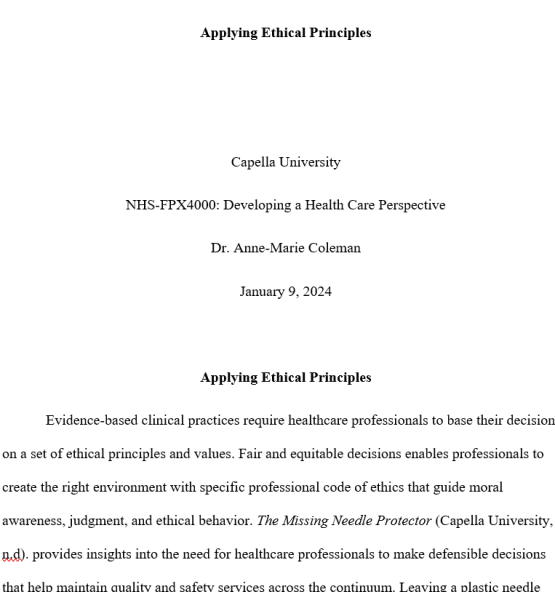
Applying Ethical Principles
Capella University
NHS-FPX4000: Developing a Health Care Perspective
Dr. Anne-Marie Coleman
January 9, 2024
Availability:In Stock
The mistake by the surgical team demonstrates the need for healthcare professionals to make informed decisions about the best approaches for optimizing care outcomes. The ethical decision making framework reinforces the need for healthcare professionals to adhere to the principles of moral awareness, moral judgment, and ethical behavior (Borhani et al., 2021). In the case study, the director demonstrated moral awareness by listening to the operating room supervisor and acknowledging the error. The reaction revealed effective leadership qualities characterized by the ability to listen without judging or reacting harshly. Moral judgment is also evident from the director’s commitment to investigating the implications of the mistake on the patient. Seeking unique perspectives from the right parties enhanced ability to make an informed decision about the right pathway (Kadivar et al., 2017). The approach enabled the director to uphold ethical behavior after considering the facts about implications of a decision to get the patient back into the surgical room or let her live with the object in her belly.
The ethical dilemma revealed the need for complete adherence to ethical principles such as beneficence, non-maleficence, justice, and autonomy. The case study raises questions about the team’s adherence to non-maleficence. Leaving a plastic needle protector in a patient’s belly undermines the principle on protecting patients from physical, emotional, and psychological harm (Varkey, 2021). However, the director made efforts to uphold beneficence and non-maleficence by considering the patient’s best interests and the need to avoid decisions that could cause harm. However, the director failed to uphold the patient’s autonomy, since he did not consider Jameson’s input on whether she wanted to get back into the surgical room. Ideally, patients have a right to know occurrence of an error and make a decision about their preferred treatment (Varkey, 2021). Similarly, allowing a general surgeon with declining mental and physical capacity to work on a patient jeopardizes the principles of beneficence, non-maleficence, and justice. The right approach would be having competent professionals to increase the chances of a successful operation.
The Missing Needle Protector highlights the importance of ethical decisions and commitment to upholding ethical principles across the continuum. Acting in a patient’s best interests requires leaders and the care team to embrace effective communication, sound decision-making, and moral awareness and judgment. Organizations should also ensure that only mentally, physically, and mentally competent staff handle patients with complex needs such as an operation. The goal is to eliminate physical, emotional, and psychological distress associated with medical errors.
WhatsApp us
Reviews
There are no reviews yet.